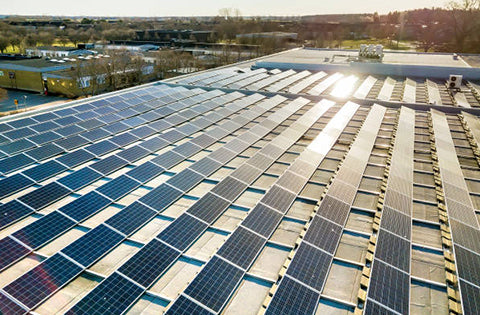
A guideline of the best off-grid solar power system

Do you feel like getting away from it all? Are you interested in running all your essential electronics without relying on the power grid? If so, we don’t blame you. There’s a strong sense of freedom in knowing that you don’t have to be tethered to the grid to charge your laptop, power your lights, or even run your AC. But in order to turn this dream into a reality, you’ll need an excellent off-grid power system that meets your lifestyle and energy needs. This article looks at what you need to know about off-grid power systems to get started, including the benefits and types. Let’s get started.
Benefits of off-grid power system
There are many benefits of using an off-grid power system. Let’s take a look at the two most common advantages.
Power in any location
Hands down one of the best benefits of off-grid power is that you can build or take it anywhere. No grid interconnect is needed so you can have all the comforts you have become accustomed to anywhere you want. Whether a cabin in the mountains, RV out in the desert, or boat in the middle of the ocean, an off-grid power system can provide where the grid cannot.
Reduced carbon footprint
Another top advantage of having an off-grid power system is a reduced carbon footprint. If you’re environmentally minded, you’ll be able to feel better about your energy consumption. Not only that, but a reduction in your carbon footprint typically means a reduction in your energy costs over time as well.
Energy independence
As you bask in the joy of reducing your fossil fuel use, you can also enjoy the amazing sense of freedom that comes with energy independence. Was there a storm that caused widespread power outages? No problem. You can even take your energy system with you as you travel. With true energy independence, there are limitless possibilities. You are your own power grid.
Most common off-grid power solutions
So how do you gain this amazing sense of freedom? With one of the most common off-grid power solutions, of course.
Batteries
At the heart of any good off-grid power system is a set of good batteries. Like your phone that charges from many different places that can be taken off-grid, batteries can do the same for your entire power system. Our batteries provide a place to store energy from any source you want to connect to. Let’s now take a look at a few power sources for off-grid systems.
Generator
Typically, we don’t think of a generator as a way to reduce our carbon footprint or get us off the grid. But let’s take a step back and compare it to being connected to the grid. Generators work by taking a fuel source, such as gasoline, diesel, or propane and turning it into AC power. Thus, when you power your boat or RV with a generator, you’ll be able to run your devices as if you were connected to shore power.
While generators provide you with a sense of freedom because they’re portable, they still rely on fossil fuels. This can get expensive, especially if you’re running it for long periods of time. However, if you have a good battery system and only use your generator to charge your batteries (or perhaps your AC or other large loads when it gets really hot), you’ll still probably use less energy than you would when connected to the grid.
Solar
This is definitely a favorite for off-grid power systems, and for a good reason. Solar panels use photovoltaic cells to harness the sun’s energy and convert it into DC electricity, which an inverter can then turn into AC power.
Solar panels are fantastic because they provide clean, free energy. The main expense you’ll have to worry about is the initial investment. Depending on how many watts of solar power you invest in, how big your battery bank is, and how large of an inverter you have, you could potentially power anything.
However, the main drawback with solar power is that the sun doesn’t shine all the time, hence why you’ll need a good battery system. Many times, off-grid power systems consist of more than one power source, like solar for the primary and a generator for backup.
Wind power
We typically think of large wind turbines placed offshore or within the mountains when we think of wind power. However, did you know that you can have your own personal windmill to power your electronics? These small wind turbines use the power of the wind to create usable electricity. They typically range from 400W to 20kW, depending on the size of the turbine. Because they only create electricity when the wind is blowing at a certain speed, many people use them in conjunction with the electrical grid or a solar setup.
Hydro power
Hydropower, of course, requires a water source and is less commonly used for personal off-grid systems. When you think of hydropower, you usually think of giant dams and huge turbines. But you can build a small version for yourself if you have access to a stream. Hydropower can be very damaging to a stream or river ecosystem so it’s important that you learn about it before building a dam. Even without a dam, however, a water wheel or small turbine can act as an auxiliary power source to supplement charging your batteries.
To learn more about off-grid solar power system, please follow XINPUGUANG official website:
Facebook: Xinpuguang Solar Panel
Instagram: xinpuguangsolar
Pinterest: XinpuguangSolarPanels
Homepage: https://xinpuguangsolar.com
Email address: Philip@isolarparts.com
- Choosing a selection results in a full page refresh.
